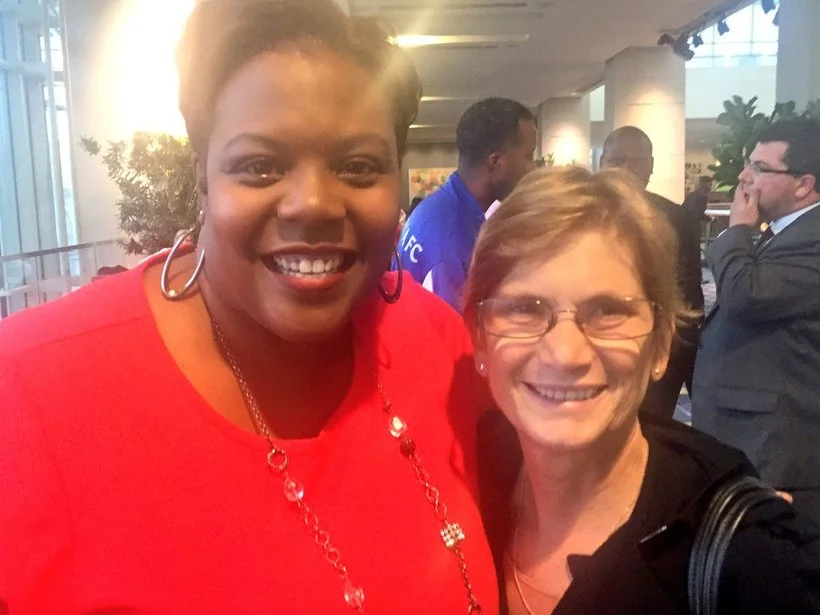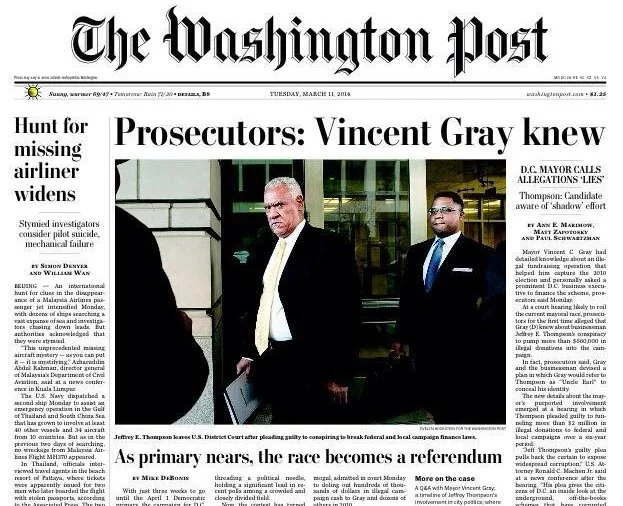See Ya, Kaya: The IMPACT on Teachers
This is the third of a three-part series on Kaya Henderson. [Part 1, Part 2]
Kaya Henderson stepped down Friday as head of D.C. Public Schools, after serving longer than all but one of her predecessors. Prior to her six years as chancellor, Henderson spent three years as top deputy to her close friend, Michelle Rhee.
The Rhee/Henderson era was marked by great fanfare, but limited results. What overall gains were made masked a painful truth: the achievement gap – between higher and lower-income students, and between white, black and Hispanic students – grew.
In 2007, despite no experience running a school system, Rhee was named chancellor. She quickly became known for mass teacher firings and school closings.
Henderson succeeded Rhee, providing DCPS with a friendlier face while continuing to carry out their shared vision.
In their near-decade atop DCPS, Rhee and Henderson oversaw unprecedented instability.
Since 2007 there’s been 70 percent teacher turnover at DCPS, according to Washington Teachers’ Union (WTU) president Elizabeth Davis. “We are still recruiting 300 to 600 new teachers every year,” Davis told In These Times.
But Henderson didn’t see this as a problem. “Churn or turnover in and of itself is not a bad thing,” she claimed, despite research showing that teacher turnover has significant negative effects on students.
DCPS’s high level of teacher churn is the result of IMPACT, a controversial evaluation system Henderson helped Rhee put in place in 2010.
“People sort of say, ‘Michelle!’ like I wasn’t there with her,” explained Henderson, claiming her due credit in a 2015 talk at the National Press Club. Laughing, she continued, “We broke a lot of china together.”
The Impact of IMPACT
In the 2010 contract negotiations between WTU and DCPS, then-union president George Parker welcomed IMPACT. The contract offered teachers increased pay, as well as significant bonuses tied to student test scores.
In exchange for greater compensation, IMPACT rolled back union protections like tenure and seniority. After signing the deal, Parker lost his reelection bid and went to work for Michelle Rhee.
The weakened teacher protections provided Rhee and Henderson the authority to conduct mass teacher firings.
This created an “atmosphere of fear,” which sparked a teacher exodus. Over 4,700 teachers voluntarily exited DCPS since 2007, according to WTU.
IMPACT “is universally detested by teachers,” the WTU wrote in January (PDF).
It is a major source of stress, drives teacher churn, and inhibits creativity in the classroom. It fosters an unhealthy atmosphere of fear, distrust, and competitiveness in the local school.
Private Money, Public Schools
To help fund the pay increases in the 2010 contract, Rhee and Henderson tapped private sources, not known for their support of unions.
Of the $64.5 million in private funding that went towards the contract, $25 million came from the Walton Foundation, funded by the Walmart-owning Walton family. The charter school-loving Broad Foundation pitched in $10 million, as did the Laura and John Arnold Foundation (recently in the news for funding undisclosed aerial spying by the Baltimore police).
Controversially, the agreement allowed the private funders to back out if Rhee was no longer chancellor, strengthening Rhee’s own job security while weakening teachers’.
When this contract came up for renegotiation in 2012, WTU had less pliant leadership and an agreement couldn’t be reached. To this day teachers are working without a contract.
This has led to protests. “On one hand our chancellor says she appreciates us, but on the other hand has walked away from the negotiating table,” Alex McKeithen, a teacher at Deal Middle School, told WAMU at a May demonstration.
It’s Good to be the Boss
While teachers continue to be evaluated using IMPACT’s harsh metrics, Henderson was more lenient in judging her own performance.
At an August press conference announcing the results of a national test, the PARCC, a reporter asked Henderson about two DCPS schools where zero percent of students tested proficient in reading.
“When you are trying to rebuild an entire system, you can’t do everything at once,” responded Henderson, who’d been at the highest levels of DCPS for nearly ten years.
“When we show you slow, steady progress, you say that’s not fast enough,” complained Henderson. But “if we had come to you where our scores were off the chain, you would tell us we were cheaters, right?”
Henderson was speaking from experience. After scores climbed under Rhee, an investigation by USA Today found abnormally high erasure rates on tests at more than a hundred DCPS schools, suggesting the possibility of widespread cheating. At one school, noted USA Today, “The odds are better for winning the Powerball grand prize than having that many erasures by chance.”
These testing irregularities were highlighted in a 2013 PBS documentary on Michelle Rhee’s tenure at DCPS (below).
Selective Coverage
When D.C.’s leading newspaper looked into the cheating scandal, it found no evidence of widespread cheating and no fault with the chancellor. This wasn’t the only time the Washington Post failed to hold Rhee and Henderson’s feet to the fire.
Through lead in schools’ water, a widening achievement gap, and serving kids spoiled food, the Post continued to support the chancellor.
In the case of the spoiled food, Henderson, rather than cutting ties, asked the food contractor for a $100,000 donation to a fund she controlled (the company gave $50,000). Henderson also fired the worker who blew the whistle on the company.
When it comes to breaking stories critical of Rhee and Henderson, the Post has missed out time and again. Meanwhile the Post rarely passes up an opportunity to cheerlead for its favored leadership team, recently declaring that Henderson is leaving behind a “legacy of progress.”
But WTU President Davis sees things differently. “If the school system itself was evaluated as a single classroom,” she told City Paper, “its teacher would have been fired six years ago.”
Click here for “The Education of Michelle Rhee,” a 2013 PBS documentary on Rhee’s time atop DCPS.


